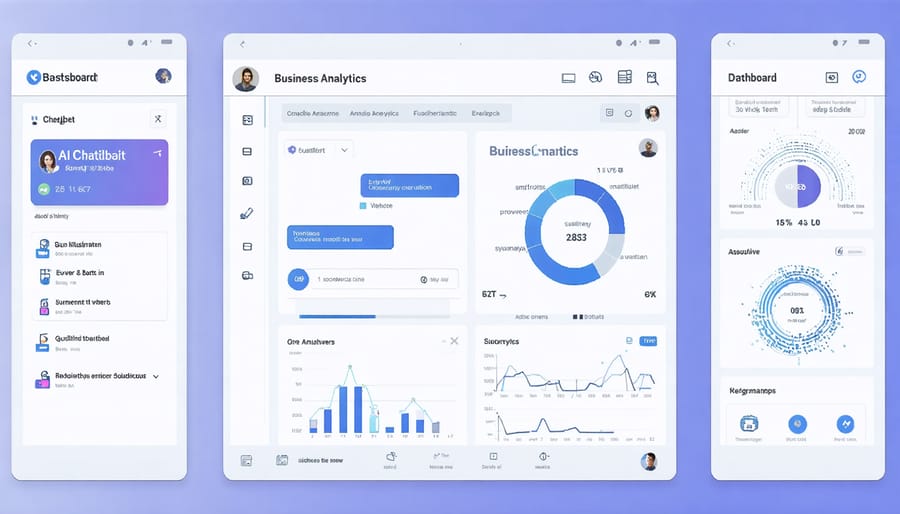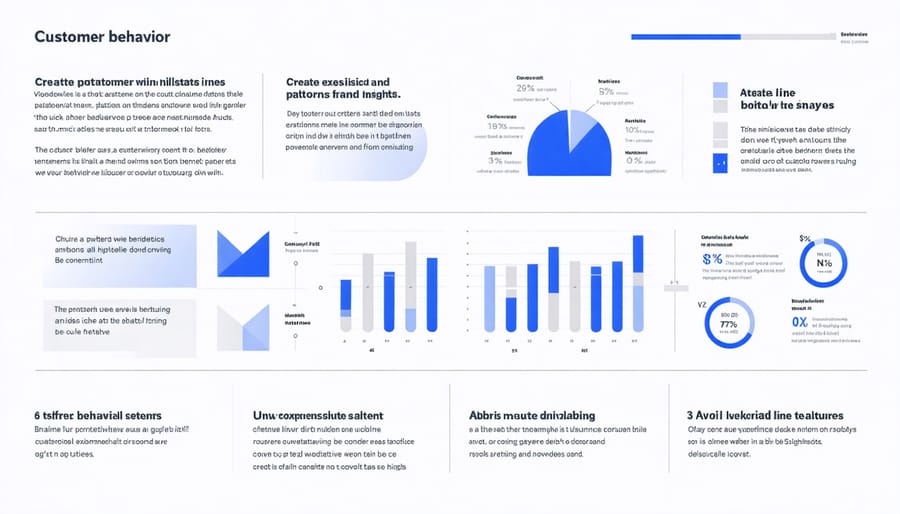How Conversational AI Transforms B2B Customer Relationships (Real Results Inside)

Conversational AI is revolutionizing how businesses interact with customers, streamlining operations, and driving revenue growth across industries. From 24/7 customer support chatbots to AI-powered sales assistants, these intelligent systems are transforming traditional business communication channels into dynamic, personalized experiences. Recent studies show that companies implementing conversational AI solutions reduce customer service costs by up to 30% while increasing customer satisfaction scores by 25%.
Today’s market demands immediate, personalized responses to customer inquiries – a need that traditional customer service models struggle to meet. Conversational AI bridges this gap by offering scalable, consistent, and intelligent interactions that adapt to customer preferences and behavior patterns. Whether it’s handling routine customer queries, qualifying leads, or facilitating complex transactions, these AI-powered solutions are becoming indispensable tools for businesses aiming to maintain competitive advantage in an increasingly digital marketplace.
This article explores practical applications of conversational AI across various business functions, from customer service to sales and marketing, providing actionable insights for implementation and optimization. We’ll examine real-world success stories and offer strategic guidance for businesses ready to leverage this transformative technology.

Real-Time Customer Support Excellence
24/7 Technical Assistance
One of the most impactful applications of conversational AI is providing 24/7 technical assistance to customers. This round-the-clock support system ensures that users can receive immediate help with technical issues, regardless of time zones or business hours. Modern AI chatbots can effectively handle common troubleshooting scenarios, guide users through setup processes, and resolve basic technical problems without human intervention.
These AI systems are particularly valuable for software companies, SaaS providers, and technology firms that need to maintain consistent support coverage. They can quickly diagnose issues by asking relevant questions, provide step-by-step solutions, and even access user documentation in real-time. When configured properly, these systems can reduce support ticket volume by up to 30-40% while maintaining high customer satisfaction rates.
The AI can be programmed to recognize urgent issues that require human escalation, ensuring critical problems receive immediate attention from technical staff. This intelligent triaging helps organizations optimize their support resources while providing faster resolution times for customers. Additionally, these systems learn from each interaction, continuously improving their ability to handle complex technical queries and adapt to new products or software updates.
For businesses looking to scale their technical support operations without proportionally increasing costs, 24/7 AI assistance represents a strategic investment in customer service efficiency.
Automated Query Resolution
Automated query resolution represents one of the most impactful applications of conversational AI, significantly streamlining customer support operations. Modern AI systems can effectively handle up to 80% of routine customer inquiries, providing instant responses to common questions about pricing, product features, order status, and basic troubleshooting.
These AI-powered systems utilize natural language processing to understand customer intent and deliver contextually relevant answers from their knowledge base. When customers reach out through chat or messaging platforms, the AI can immediately categorize their queries and provide appropriate solutions, whether it’s tracking a shipment, resetting a password, or explaining return policies.
What makes these systems particularly effective is their ability to recognize when an issue requires human intervention. Through sophisticated sentiment analysis and complexity assessment, the AI can smoothly escalate conversations to human agents when dealing with sensitive issues, complex problems, or emotionally charged situations. This intelligent triage ensures that human support staff can focus on high-value interactions while routine matters are handled automatically.
For businesses, this translates to reduced response times, consistent service quality, and significant cost savings in customer support operations. Additionally, these systems continuously learn from interactions, improving their response accuracy over time.
Personalized Sales Conversations
Lead Qualification Automation
Lead qualification has traditionally been a time-consuming process requiring significant manual effort from sales teams. However, conversational AI is revolutionizing this aspect of B2B sales by automating the initial screening and nurturing of potential leads. By implementing AI-powered chatbots and virtual assistants, businesses can create personalized customer experiences while efficiently qualifying leads 24/7.
These AI systems can engage with prospects in real-time, asking relevant qualifying questions, gathering essential information, and scoring leads based on predetermined criteria. The automation process helps identify high-potential leads quickly, allowing sales teams to focus their efforts on the most promising opportunities.
Key benefits of AI-powered lead qualification include:
– Consistent lead scoring across all interactions
– Immediate response to prospect inquiries
– Automated follow-up sequences
– Data-driven insights into prospect behavior
– Reduced cost per qualified lead
The system can also handle routine tasks such as scheduling meetings, sending relevant content, and maintaining contact records. As leads progress through the qualification process, the AI learns from each interaction, continuously improving its ability to identify qualified prospects and predict conversion likelihood.
For maximum effectiveness, businesses should integrate their conversational AI with existing CRM systems and sales tools, ensuring seamless data flow and maintaining a complete view of the customer journey.

Smart Product Recommendations
Smart product recommendations powered by conversational AI are revolutionizing how businesses interact with their customers during the buying journey. By leveraging advanced AI personalization strategies, businesses can now offer highly targeted product suggestions based on real-time conversations and historical data.
These intelligent systems analyze various data points, including past purchases, browsing behavior, and direct customer interactions to create a comprehensive understanding of customer needs. When integrated with chatbots or virtual assistants, the AI can make contextually relevant suggestions during live conversations, significantly improving the likelihood of purchase completion.
For B2B companies, smart recommendations are particularly valuable as they can understand complex business requirements and suggest appropriate solutions. For instance, when a manufacturing company inquires about industrial equipment, the AI can recommend complementary products, maintenance services, or bulk purchase options based on their specific industry requirements and usage patterns.
The system continuously learns from each interaction, refining its suggestions over time. This adaptive approach ensures that recommendations become increasingly accurate and relevant, leading to higher conversion rates and customer satisfaction. Businesses implementing these systems typically see a 10-30% increase in average order value and improved customer retention rates through more personalized shopping experiences.
Account Management Enhancement
Proactive Communication
Proactive communication through conversational AI represents a significant shift from reactive to anticipatory customer service. Modern AI systems can analyze customer behavior patterns, purchase history, and interaction data to initiate meaningful conversations at precisely the right moment. This capability enables businesses to engage customers before issues arise or when opportunities for upselling present themselves.
For instance, AI can automatically trigger check-in messages after product purchases, schedule maintenance reminders, or send personalized product recommendations based on browsing history. These systems can identify when customers are likely to need assistance, such as when they spend extended time on specific website pages or exhibit signs of purchase hesitation.
The technology also excels at maintaining consistent follow-up schedules. Whether it’s sending appointment confirmations, tracking shipment updates, or requesting feedback after service completion, AI ensures no customer interaction falls through the cracks. This systematic approach to communication helps businesses maintain strong customer relationships while reducing the workload on human staff.
What sets modern conversational AI apart is its ability to personalize these proactive interactions. By learning from previous conversations and customer preferences, the system can tailor its communication style, timing, and content to match each customer’s unique needs. This level of personalization helps businesses build stronger customer relationships while maintaining efficiency in their communication processes.
Order Status and Updates
Order status and tracking inquiries are among the most common customer service requests, making this an ideal application for conversational AI. By implementing automated order tracking systems, businesses can provide instant, accurate updates while reducing the workload on customer service teams.
Modern conversational AI platforms can seamlessly integrate with existing order management systems to provide real-time updates through multiple channels, including chat widgets, messaging apps, and voice assistants. When customers inquire about their orders, the AI can instantly access order details, shipping information, and delivery estimates, providing precise responses without human intervention.
These systems can proactively notify customers about important milestones, such as order confirmation, shipping updates, and delivery estimates. The AI can also handle related queries about return policies, shipping methods, and delivery timeframes, offering a comprehensive support experience.
Key benefits include:
– 24/7 availability for order status inquiries
– Reduced support ticket volume for routine tracking requests
– Consistent and accurate information delivery
– Proactive communication about delays or issues
– Seamless escalation to human agents when needed
For optimal implementation, businesses should ensure their AI system can handle complex queries like multiple order tracking, address changes, and order modification requests. The system should also maintain conversation context and recognize customer-specific information for personalized interactions.
Data-Driven Client Insights

Behavioral Analytics
Conversational AI platforms excel at capturing and analyzing valuable behavioral data from every customer interaction. By leveraging predictive analytics, businesses can uncover patterns in customer preferences, common pain points, and buying behaviors. This insight enables companies to personalize their service delivery and anticipate customer needs more effectively.
The analysis of conversation flows reveals which products or services generate the most inquiries, what times customers are most active, and which communication styles result in better engagement. These insights help businesses optimize their messaging, timing, and approach to customer interactions.
Key benefits of behavioral analytics in conversational AI include:
– Identification of trending customer concerns before they become widespread issues
– Recognition of successful conversation patterns that lead to conversions
– Understanding of customer sentiment and satisfaction levels in real-time
– Discovery of cross-selling and upselling opportunities based on interaction history
By monitoring these metrics, businesses can continuously refine their conversational AI systems to better serve customer needs while improving operational efficiency. This data-driven approach ensures that automated customer interactions become more natural and effective over time, leading to higher satisfaction rates and increased customer loyalty.
Feedback Collection
Conversational AI excels at gathering and analyzing customer feedback systematically, offering businesses a scalable way to understand customer sentiment and preferences. These AI-powered systems can automatically initiate feedback collection through various channels, including chat interfaces, messaging apps, and email, ensuring consistent data gathering without overwhelming customers.
The automated process works by engaging customers at optimal moments, such as after a purchase or service interaction, using natural language processing to ask relevant questions and interpret responses. Unlike traditional surveys, conversational AI can adapt its questions based on previous answers, creating a more personalized and engaging feedback experience.
What sets this approach apart is its ability to analyze feedback in real-time, identifying patterns, trends, and urgent issues that require immediate attention. The system can categorize feedback by sentiment, topic, and priority, providing businesses with actionable insights without manual processing.
For example, a retail business might use conversational AI to gather feedback about a recent online purchase, automatically flagging negative experiences for customer service follow-up while collecting valuable data about product satisfaction and delivery performance. This proactive approach helps businesses address issues quickly while maintaining a comprehensive understanding of customer satisfaction levels.
As we’ve explored throughout this article, conversational AI represents a transformative opportunity for B2B customer engagement. The benefits are clear and compelling: reduced response times, enhanced customer satisfaction, consistent 24/7 support, and significant cost savings through automation. By implementing conversational AI solutions, businesses can maintain high-quality customer interactions while freeing up valuable human resources for more complex tasks and strategic initiatives.
The success stories and use cases we’ve discussed demonstrate that conversational AI isn’t just a technological novelty – it’s becoming a competitive necessity in the B2B landscape. From lead qualification and appointment scheduling to technical support and order processing, AI-powered conversational tools are proving their worth across various business functions.
For businesses considering implementation, the time to act is now. Start small by identifying specific processes where conversational AI can make an immediate impact. Focus on areas with high-volume, repetitive interactions or where response time is crucial. Build from there, continuously learning from user interactions and refining your AI systems based on actual customer feedback and engagement patterns.
Remember that successful implementation requires a balanced approach. While automation is powerful, it should complement rather than replace human interaction. The most effective conversational AI strategies maintain the perfect blend of automated efficiency and human touch, ensuring that complex issues are appropriately escalated to human agents when necessary.
The investment in conversational AI today will pay dividends in the future through improved customer relationships, operational efficiency, and competitive advantage. As the technology continues to evolve and become more sophisticated, early adopters will find themselves better positioned to meet changing customer expectations and market demands.
Take the first step by assessing your current customer engagement processes and identifying opportunities where conversational AI can add value. With careful planning and strategic implementation, you can transform your customer engagement approach and set your business up for long-term success in an increasingly digital marketplace.
Leave a Reply